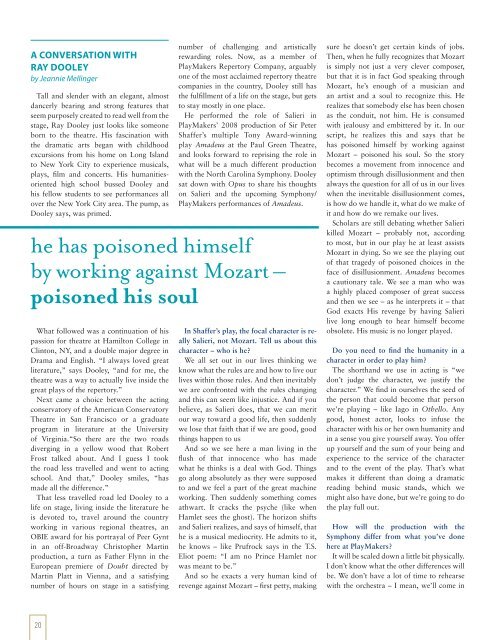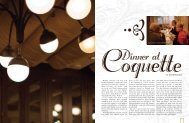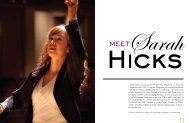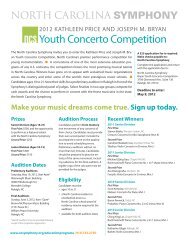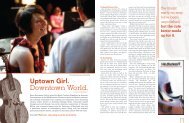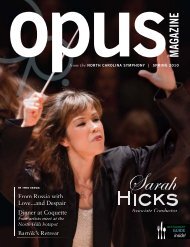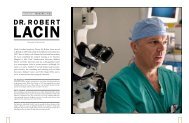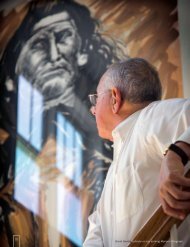Opus magazine - North Carolina Symphony
Opus magazine - North Carolina Symphony
Opus magazine - North Carolina Symphony
- No tags were found...
You also want an ePaper? Increase the reach of your titles
YUMPU automatically turns print PDFs into web optimized ePapers that Google loves.
A Conversation with<br />
Ray Dooley<br />
by Jeannie Mellinger<br />
Tall and slender with an elegant, almost<br />
dancerly bearing and strong features that<br />
seem purposely created to read well from the<br />
stage, Ray Dooley just looks like someone<br />
born to the theatre. His fascination with<br />
the dramatic arts began with childhood<br />
excursions from his home on Long Island<br />
to New York City to experience musicals,<br />
plays, film and concerts. His humanitiesoriented<br />
high school bussed Dooley and<br />
his fellow students to see performances all<br />
over the New York City area. The pump, as<br />
Dooley says, was primed.<br />
What followed was a continuation of his<br />
passion for theatre at Hamilton College in<br />
Clinton, NY, and a double major degree in<br />
Drama and English. “I always loved great<br />
literature,” says Dooley, “and for me, the<br />
theatre was a way to actually live inside the<br />
great plays of the repertory.”<br />
Next came a choice between the acting<br />
conservatory of the American Conservatory<br />
Theatre in San Francisco or a graduate<br />
program in literature at the University<br />
of Virginia.“So there are the two roads<br />
diverging in a yellow wood that Robert<br />
Frost talked about. And I guess I took<br />
the road less travelled and went to acting<br />
school. And that,” Dooley smiles, “has<br />
made all the difference.”<br />
That less travelled road led Dooley to a<br />
life on stage, living inside the literature he<br />
is devoted to, travel around the country<br />
working in various regional theatres, an<br />
OBIE award for his portrayal of Peer Gynt<br />
in an off-Broadway Christopher Martin<br />
production, a turn as Father Flynn in the<br />
European premiere of Doubt directed by<br />
Martin Platt in Vienna, and a satisfying<br />
number of hours on stage in a satisfying<br />
number of challenging and artistically<br />
rewarding roles. Now, as a member of<br />
PlayMakers Repertory Company, arguably<br />
one of the most acclaimed repertory theatre<br />
companies in the country, Dooley still has<br />
the fulfillment of a life on the stage, but gets<br />
to stay mostly in one place.<br />
He performed the role of Salieri in<br />
PlayMakers’ 2008 production of Sir Peter<br />
Shaffer’s multiple Tony Award-winning<br />
play Amadeus at the Paul Green Theatre,<br />
and looks forward to reprising the role in<br />
what will be a much different production<br />
with the <strong>North</strong> <strong>Carolina</strong> <strong>Symphony</strong>. Dooley<br />
sat down with <strong>Opus</strong> to share his thoughts<br />
on Salieri and the upcoming <strong>Symphony</strong>/<br />
PlayMakers performances of Amadeus.<br />
he has poisoned himself<br />
by working against Mozart –<br />
poisoned his soul<br />
In Shaffer’s play, the focal character is really<br />
Salieri, not Mozart. Tell us about this<br />
character – who is he<br />
We all set out in our lives thinking we<br />
know what the rules are and how to live our<br />
lives within those rules. And then inevitably<br />
we are confronted with the rules changing<br />
and this can seem like injustice. And if you<br />
believe, as Salieri does, that we can merit<br />
our way toward a good life, then suddenly<br />
we lose that faith that if we are good, good<br />
things happen to us<br />
And so we see here a man living in the<br />
flush of that innocence who has made<br />
what he thinks is a deal with God. Things<br />
go along absolutely as they were supposed<br />
to and we feel a part of the great machine<br />
working. Then suddenly something comes<br />
athwart. It cracks the psyche (like when<br />
Hamlet sees the ghost). The horizon shifts<br />
and Salieri realizes, and says of himself, that<br />
he is a musical mediocrity. He admits to it,<br />
he knows – like Prufrock says in the T.S.<br />
Eliot poem: “I am no Prince Hamlet nor<br />
was meant to be.”<br />
And so he exacts a very human kind of<br />
revenge against Mozart – first petty, making<br />
sure he doesn’t get certain kinds of jobs.<br />
Then, when he fully recognizes that Mozart<br />
is simply not just a very clever composer,<br />
but that it is in fact God speaking through<br />
Mozart, he’s enough of a musician and<br />
an artist and a soul to recognize this. He<br />
realizes that somebody else has been chosen<br />
as the conduit, not him. He is consumed<br />
with jealousy and embittered by it. In our<br />
script, he realizes this and says that he<br />
has poisoned himself by working against<br />
Mozart – poisoned his soul. So the story<br />
becomes a movement from innocence and<br />
optimism through disillusionment and then<br />
always the question for all of us in our lives<br />
when the inevitable disillusionment comes,<br />
is how do we handle it, what do we make of<br />
it and how do we remake our lives.<br />
Scholars are still debating whether Salieri<br />
killed Mozart – probably not, according<br />
to most, but in our play he at least assists<br />
Mozart in dying. So we see the playing out<br />
of that tragedy of poisoned choices in the<br />
face of disillusionment. Amadeus becomes<br />
a cautionary tale. We see a man who was<br />
a highly placed composer of great success<br />
and then we see – as he interprets it – that<br />
God exacts His revenge by having Salieri<br />
live long enough to hear himself become<br />
obsolete. His music is no longer played.<br />
Do you need to find the humanity in a<br />
character in order to play him<br />
The shorthand we use in acting is “we<br />
don’t judge the character, we justify the<br />
character.” We find in ourselves the seed of<br />
the person that could become that person<br />
we’re playing – like Iago in Othello. Any<br />
good, honest actor, looks to infuse the<br />
character with his or her own humanity and<br />
in a sense you give yourself away. You offer<br />
up yourself and the sum of your being and<br />
experience to the service of the character<br />
and to the event of the play. That’s what<br />
makes it different than doing a dramatic<br />
reading behind music stands, which we<br />
might also have done, but we’re going to do<br />
the play full out.<br />
How will the production with the<br />
<strong>Symphony</strong> differ from what you’ve done<br />
here at PlayMakers<br />
It will be scaled down a little bit physically.<br />
I don’t know what the other differences will<br />
be. We don’t have a lot of time to rehearse<br />
with the orchestra – I mean, we’ll come in<br />
fully prepped and ready to go and I think<br />
we’ll be rehearsing music cues with the<br />
orchestra and overlaps. There are some<br />
sections where Salieri is talking when the<br />
orchestra plays and I have to arrive at the<br />
end at the same time the musicians do, so<br />
we’ll probably spend a lot of time working<br />
on those things.<br />
Joe [Haj] is fond of saying that every year<br />
we need to pick something that we really<br />
have no idea how we’re going to do and<br />
this may be it. But we’ll solve it and it will<br />
be even more compelling if we’re solving it<br />
right there in the moment.<br />
What do you find audiences seem to<br />
enjoy most about this play<br />
One of the aspects of this text is that<br />
there is a great deal of direct address to the<br />
audience. Salieri is speaking to the ghosts<br />
of the future asking for understanding and<br />
also at the end hoping to perhaps restore his<br />
sense of purpose in the world, to ensure that<br />
his life has not been in vain.<br />
Accordingly, that relationship between<br />
the actor playing Salieri and the audience<br />
becomes the principal relationship<br />
in the play. The scenes become lived-out<br />
demonstrations of what Salieri has been<br />
trying express to the audience. Setting that<br />
rapport with the audience, making it a twoway<br />
street, talking with the audience, not<br />
at them, developing that relationship – this<br />
is among the cleverest and richest relationships<br />
between the actor and the audience<br />
that I know of in all of theatre. The audience<br />
has a role to play. As the ghosts of the<br />
future, they are being appealed to and they<br />
do affect what the actor playing Salieri<br />
does and how he goes about getting what<br />
he needs from the event that is happening<br />
in the room.<br />
And you will be sharing the stage with<br />
the orchestra and the conductor…<br />
As I’m thinking about this right now,<br />
that is one question we are going to have<br />
to ask theatrically – there’s the actor and<br />
the audience and now what about the<br />
orchestra And the conductor Are they<br />
now a third character And if so, how<br />
does Salieri deal with that And as I say<br />
that, I have no idea. All questions to be<br />
solved. It will become real – the imagined<br />
life and the real life come together. That’s<br />
live theater.<br />
COMPOSER PORTRAITS: MOZART<br />
Peter SHAFFER’S AMADEUS<br />
FRI, DEC 3 – sat, DEC 4, 8PM<br />
SUN, DEC 5, 3PM<br />
Visit www.ncsymphony.org<br />
or call 919.733.2750<br />
or toll free 877.627.67824<br />
20<br />
21


